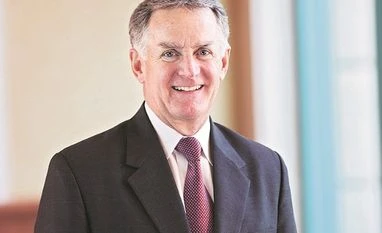One of the reasons why I am here is to spend some time with the new leader, Arun Kumar, be in town halls with our people and meet a number of our clients, along with Arun.
We have a very strong and consistent global strategy and vision of what the firm wants to achieve. That has to be adapted to unique circumstances in each market. What each of the senior partner in large member firms needs to do is to take our global strategy and fit it into the local circumstances. That’s what Arun would be focussed on.
We did town halls in Mumbai and Delhi. We talked specifically about how this will create opportunities for people here. One of the great things about (working for) KPMG is that you could have twenty different careers and never change your business card. The vision that we have for India is to become a talent hub globally, and that translates into new opportunities for people here. This is going to ensure that KPMG continues to remain a magnet for talent and employer of choice in India.
I think it surprised everyone, frankly. Having said that, while we saw some impact in the short term and some pull back in activity, the good news is that we are almost back to business as usual. The long-term benefits that demonetisations will provide to the economy will far outweigh the short-term disruptions that happened for couple of months.
To achieve long-term benefits for the economy, it is important to go through some disruptions. GST will require change and companies have to do lot more to be GST-ready. There will be some disruption but it is important for creating a common market within India. There is still some way to go for the legislation to be ready for companies to finalise their plans. Larger companies are more active but many small and medium-sized companies have lot of work to do.
I am very optimistic that a number of things that the business community has been talking about – a fair tax system and a smarter regulatory environment – this administration will be responsive to them. I believe tax reforms in the US will create a more level playing field for multinationals based in that country.
It will be important for this administration to hear from businesses that invest in the US. I think President Trump is looking for fair trade, smart regulation and an environment that is conducive to growth. There are large numbers of India-based companies that are creating jobs in a very rapid pace in the US. My suggestion to them is: Get engaged with this administration. It is important for this administration to get aware of the positive impact on US jobs and investment that some of the India-based companies are creating.
Every country is concerned about the health and growth of its economy. There is nothing inconsistent about Make in India and America First. They both are consistent with responsibilities of leaders to make sure employment and health of their economies is conducive to successful outcomes for their people.
Digitalisation is very important for India as a destination of foreign investment going forward. There is an opportunity for India to leapfrog many other countries through an aggressive path of digitisation of the economy. The reforms around corruption are also very important and I know will continue. These are all challenging issues and will take time to solve.
One is about tax. Companies look for consistency and certainty in tax regimes. Secondly, the regulatory environment – there is need to streamline and speed-up the approval process to get things done.
Brexit had an immediate impact for two or three months when there was a slowdown in activity, but it got back to normal fairly quickly. The real impact of Brexit on the economy will be a year and a half to two years down the road. Depending on the shape that Brexit will take it will have an impact perhaps greater than what we saw immediately after the vote.
To read the full story, Subscribe Now at just Rs 249 a month
Already a subscriber? Log in
Subscribe To BS Premium
₹249
Renews automatically
₹1699₹1999
Opt for auto renewal and save Rs. 300 Renews automatically
₹1999
What you get on BS Premium?
-
Unlock 30+ premium stories daily hand-picked by our editors, across devices on browser and app.
-
Pick your 5 favourite companies, get a daily email with all news updates on them.
Full access to our intuitive epaper - clip, save, share articles from any device; newspaper archives from 2006.
Preferential invites to Business Standard events.
Curated newsletters on markets, personal finance, policy & politics, start-ups, technology, and more.
Need More Information - write to us at assist@bsmail.in
)